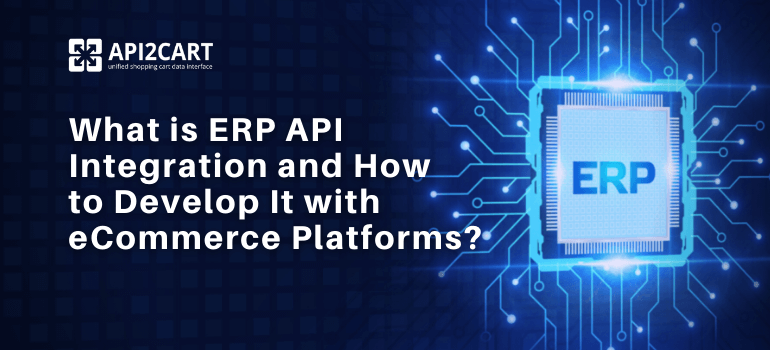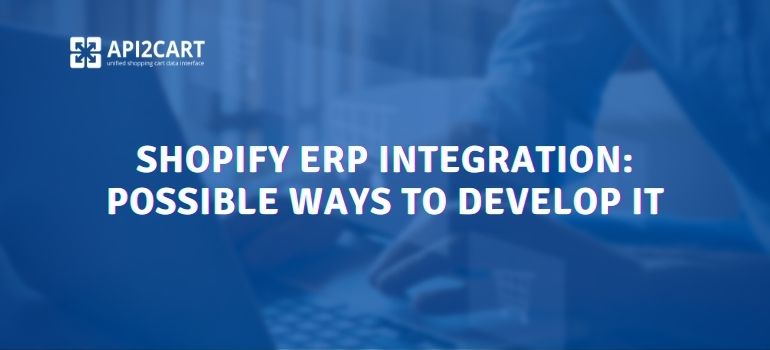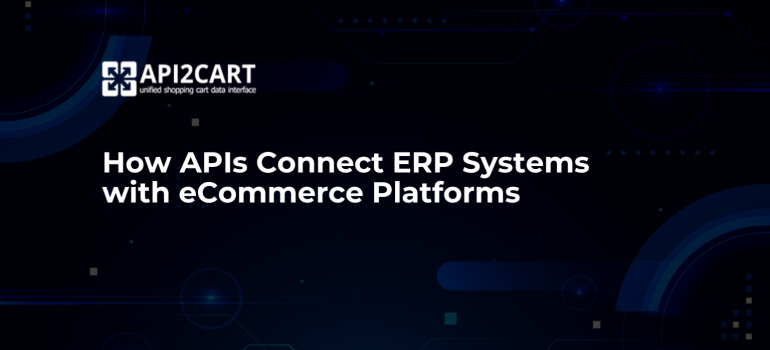
In today’s quickly changing digital landscape, businesses need efficient operations to remain competitive. Enterprise Resource Planning (ERP) systems have become the backbone of many organizations, offering strong solutions for managing inventory, accounting, customer relationships, and more. However, in isolation, even the most advanced ERP systems may struggle to meet the changing needs of modern business operations. This is especially true for businesses operating across multiple platforms, such as eCommerce.
This is where Application Programming Interfaces (APIs) step in as key tools. APIs act as digital bridges, smoothly connecting ERP systems with eCommerce platforms, enabling businesses to synchronize data in real time, automate workflows, and enhance operational efficiency. For software providers, understanding how to use API integration with ERP systems is important to delivering solutions that support their clients’ growth in an increasingly interconnected world. In this article, we’ll explore the significance of ERP and API integration, delve into how APIs connect ERP systems with eCommerce platforms, and highlight the benefits this cooperation brings to businesses and software providers.
What is an ERP System and ERP Integration?
An ERP system is a complete software solution designed to combine, connect, and automate core business processes across an organization. For software providers, an ERP system serves as the backbone of enterprise operations, enabling businesses to manage and simplify activities, such as inventory management, order processing, customer relationship management (CRM), finance, human resources, and supply chain operations from a single, unified platform. APIs allow software providers to integrate ERP systems with platforms, such as Shopify, WooCommerce, BigCommerce, or Magento, enabling real-time data exchange for inventory, orders, and customer information. This integration ensures smoother workflows and makes the customer experience easier.
An ERP system is more than just software, it’s the central and main system of a business. For software providers, understanding ERP systems and their integration capabilities is important for delivering flexible, efficient, and future-ready solutions. By using APIs, ERP systems can smoothly connect with eCommerce platforms, CRM systems, and other third-party tools, creating an ecosystem where data flows effortlessly, operations are streamlined, and businesses are empowered to grow steadily.
ERP Integration is the process of connecting an ERP system with other business software solutions, including eCommerce platforms, CRM tools, supply chain management software, payment gateways, and business intelligence tools. The integration allows these systems to share data in real-time and ensures that information remains correct, consistent, and accessible across the organization. ERP integration uses APIs to enable communication between the ERP system and third-party tools, allowing for automated workflows and reducing the need for manual intervention.
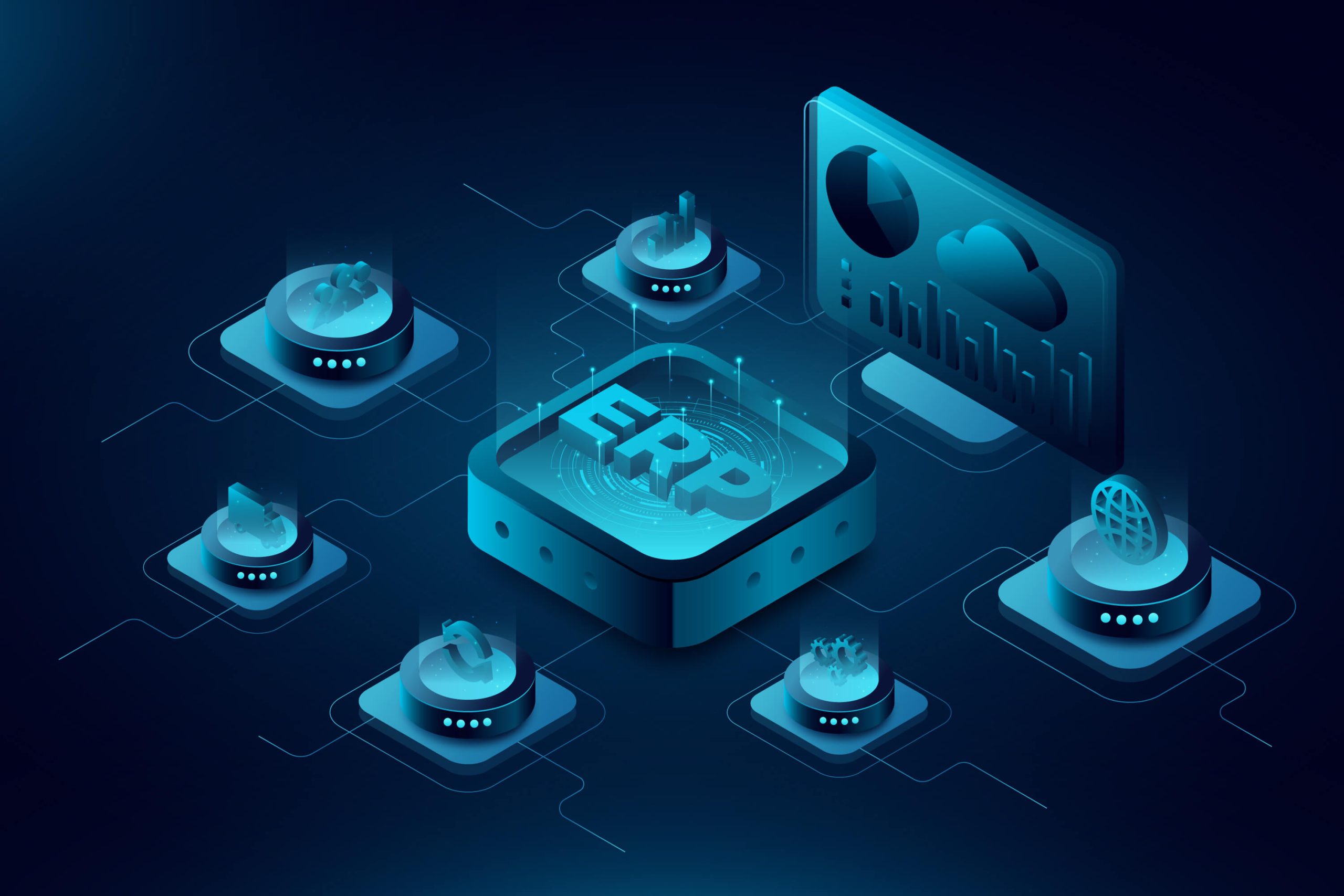
What is API Integration?
API integration is the process of connecting two or more software applications or systems through their APIs to enable smooth data exchange, features sharing, and automated workflows. For software providers, API integration is the key to building flexible, efficient, and compatible solutions that adapt to the evolving needs of businesses and meet the complex demands of modern digital ecosystems.
By implementing robust API integrations, software providers can not only enhance the functionality and interoperability of their solutions but also empower them to streamline workflows, improve productivity, and deliver exceptional customer experiences. APIs serve as standardized gateways, allowing different software solutions, often developed by different teams or companies, to work together efficiently without requiring extensive custom development.

Difficulties of eCommerce ERP API Integration
Integrating eCommerce platforms with ERP systems via APIs is essential for streamlining operations, managing data consistency, and enhancing efficiency. However, this integration comes with a range of technical, operational, and strategic challenges. For software providers, understanding these difficulties is key to developing robust, scalable, and efficient integration solutions:
1. Compatibility Issues
eCommerce platforms such as Shopify, Magento, WooCommerce, BigCommerce, OpenCart, PrestaShop, and others use different technologies and frameworks. ERP systems like SAP and NetSuite are also built differently. Because of this, achieving seamless integration between them becomes a technical challenge. Differences in API versions or deprecated endpoints can cause incompatibilities that require frequent updates to maintain functionality.
2. Data Synchronization Challenges
Ensuring real-time data synchronization (e.g., for inventory, orders, and customer details) can be difficult due to system limitations or API rate limits. Disparate data formats (e.g., JSON in APIs versus XML in legacy ERPs) require complex mapping and transformation processes. Inconsistent data validation rules between systems can lead to failed transactions, requiring robust error detection and recovery mechanisms.
3. Scalability and Performance
eCommerce platforms often experience surges in activity during peak sales periods (e.g., holidays), which can overwhelm APIs or the ERP system if the integration is not designed for scalability. Poorly optimized integrations can result in delays in order processing or inventory updates, affecting the customer experience.
4. Security Concerns
Integrating systems involves sharing sensitive data, such as customer information and payment details, requiring strict compliance with data protection regulations (GDPR, CCPA). Implementing secure API access through OAuth or API keys can be complex and requires ongoing management.
5. Customization and Flexibility
Each business has unique workflows and processes, requiring customized API integrations that are both time-consuming and resource-intensive. Many ERP systems are heavily customized, making standard API integrations incompatible without significant modifications.
6. Maintenance and Updates
eCommerce platforms and ERPs regularly update their APIs, requiring continuous monitoring and updates to the integration. Older ERP systems may lack modern APIs, forcing software providers to rely on middleware or custom solutions to bridge the gap.
7. Cost and Resource Constraints
Building and testing robust API integrations is a resource-intensive process, especially for smaller software providers. Maintaining integrations post-implementation, including addressing bugs and handling client-specific issues, adds to operational costs.
8. Testing and Quality Assurance
Integration testing must account for various edge cases, such as partial order fulfillment or failed API calls, to ensure seamless functionality. Differences between test environments and live systems can lead to unanticipated issues post-deployment.
While eCommerce ERP API integration offers immense value, addressing these challenges requires a combination of technical expertise, strategic planning, and ongoing support. For software providers, successfully overcoming these hurdles can result in robust, scalable solutions that enhance client satisfaction and competitive advantage.

API2Cart API Methods for ERP Solutions
With API2Cart you can integrate with many eCommerce platforms and marketplaces through a unified API, at once. You will use it to easily connect your ERP solution to Magento, Shopify, Opencart, PrestaShop, eBay, Amazon, etc. That means you won't have to spend your company's time, money, and effort to develop the integration with all of these platforms separately. In addition, API2Cart will take care of further integration support and updates. Therefore, you don’t need to hire a full staff of new software developers.
Below we describe the main methods for integrating the EPR software API:
Import orders
- Webhook for order.add event: The first is to set the webhooks for order.add event so you get notified when a new order is placed. Webhooks are a much more useful way to do that. They work better than polling an API. This method reduces server load and uses fewer API requests. It also provides more up-to-date information.
- Order.list method: You can also track new orders by running order.list method in a while to get a list of products that you want to import to your system. Create time with created_from and created_to parameters and then filter orders by them.
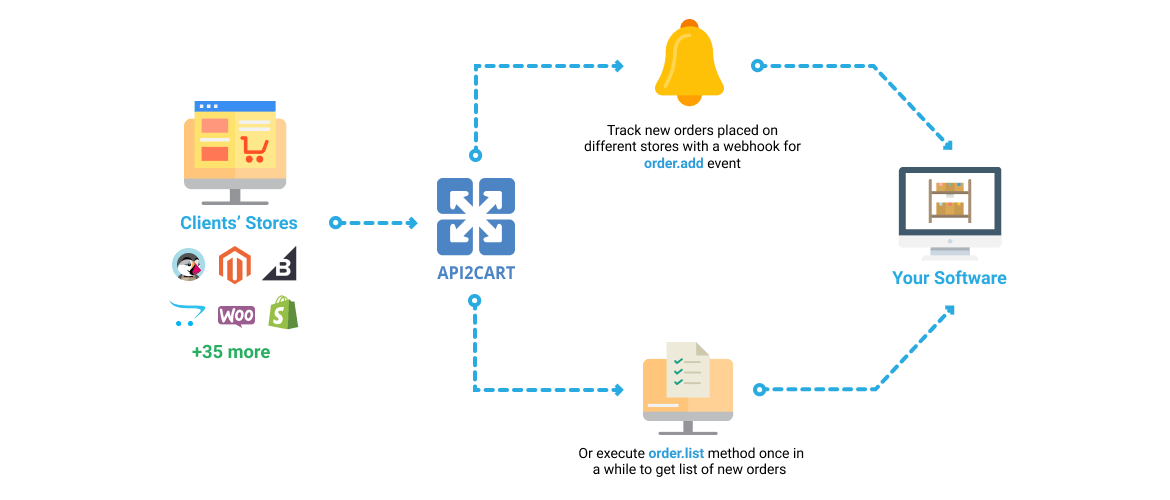
Inventory control
For retail business, it is vital to maintain inventory data accurately and synced at all sales channels. For order.add events you get notified via webhook, you retrieve new orders via order.list method. With product.update method you can update stock quantities for all sales channels by using increase_quantity and decrease_quantity parameters.
Automate shipping
Seamlessly notify end customers by automatically insert shipment tracking URL or update tracking info into the eCommerce store through order.shipment.tracking.add.
With order.shipment.update and order.shipment.add you can create shipments and add tracking numbers to orders. Order statuses are updated through the order.update method.
Work with categories
API2Cart provides the ability to work with categories in a number of ways, we have the following methods:
Make reports
Let your customers get a full view of what’s going on and how resources are being spent through analytics and reports:
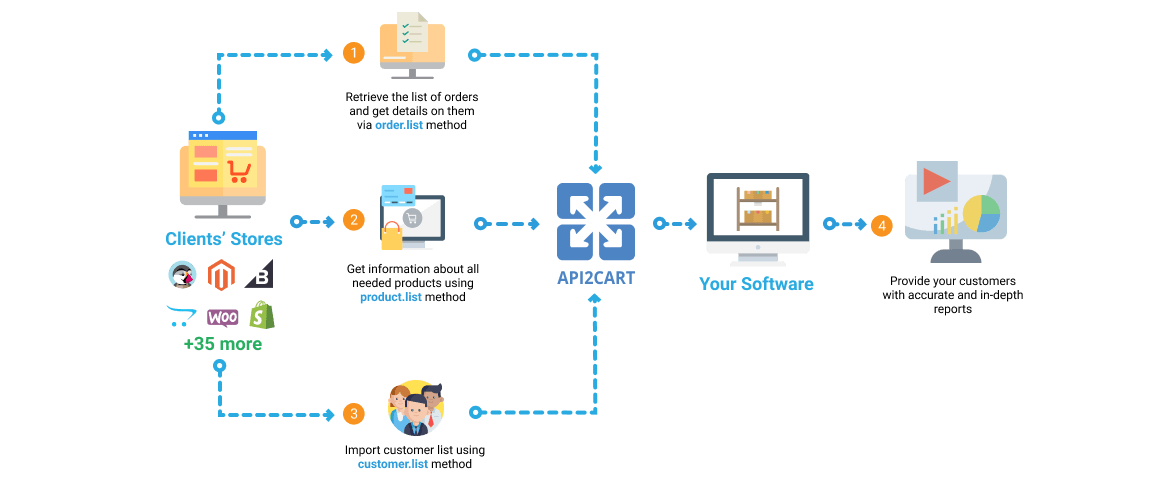
To learn more about supported methods of integration by API2Cart visit our documentation section.
API2Cart is exactly what you need to establish connections with eCommerce platforms and marketplaces without spending too much money and resources. The API2Cart has all the needed API methods, allowing ERP solutions to give all its functions to e-retailers.
We will help you quickly and efficiently integrate your ERP API with more than 60+ eCommerce platforms, including Shopify, Magento, WooCommerce, BigCommerce, OpenCart, PrestaShop, and others . If you want to learn how API2Cart can help your ERP software attract more customers, check out our detailed information and examples. You can also learn how to integrate with multiple shopping carts at once. To explore all features in detail, book a FREE demo and schedule a call with our sales representative.
Conclusion
In the fast-changing world of digital commerce, smooth connection between ERP systems and eCommerce platforms is a necessity. APIs play an important role in bridging these systems, enabling real-time data exchange, streamlined workflows, and enhanced operational efficiency. For software providers, understanding and using API integration is key to delivering solutions that not only meet but exceed customer expectations. By addressing challenges such as compatibility issues, data synchronization, and ability to grow, software providers can achieve better results. This approach helps them unlock the full potential of ERP systems. It also strengthens API integration with eCommerce platforms. This helps businesses to automate complex processes, improve customer experiences, and drive steady growth in an increasingly interconnected marketplace.
As eCommerce continues to grow, the demand for robust ERP and API integration will only increase. Software providers who prioritize innovation, scalability, and secure API implementations will position themselves as indispensable partners in their clients’ digital transformation journeys. The synergy between ERP systems and eCommerce platforms, facilitated by APIs, is a game-changer. It paves the way for future-ready business operations. It also helps companies gain a strong position.
